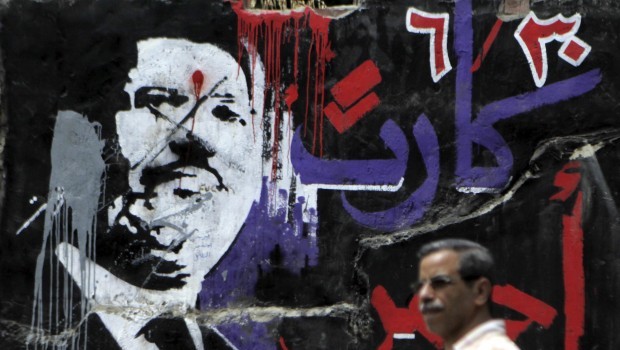
A man walks past graffiti depicting ousted Egyptian president Mohamed Mursi in downtown Cairo on September 2, 2013. (REUTERS/Amr Abdallah Dalsh)
The agency said Prosecutor-General Hisham Barakat referred Mursi and 14 other Muslim Brotherhood members to the Cairo Criminal Court on Sunday on charges including committing acts of violence and incitement to murder, all of which took place around the Ittihadiyah Presidential Palace in Cairo on December 5, 2012.
The charges refer to violence that erupted between demonstrators and supporters of the Muslim Brotherhood at rival rallies outside the presidential palace, in which around a dozen protesters were killed.
In the meantime, on Sunday the interim governments announced the formation of the “committee of fifty” tasked with amending the 2012 constitution, which has been suspended since Mursi’s ouster in July.
Interim President Adly Mansour issued a republican decree to form the committee to amend the constitution which was drafted by Islamist legislators in the Mursi era.
The constitution was suspended following a meeting between political and religious figures, which was followed by the announcement of Mursi’s ouster on July 3. A new road map was also announced that included a decision to amend the constitution, which was drafted by Islamists after the withdrawal of representatives of liberal political parties and the Coptic Church.
President Mansour ordered the formation of a 10-member Committee of Experts to amend disputed articles in the constitution in July. The committee, according to the decree issued on July 8, must present its amendments to the committee of fifty, who will have the right to amend, delete or add articles to the constitution.
The official presidential spokesman said the 10-member committee would be represented in the meetings of the 50-member Committee to explain their point of view, without having a vote.
The 50-member Committee includes five women, among them chair of the Women’s National Council, Mervat Tellawi. It also includes former Brotherhood leading figure Kamal Halbawi, former presidential candidate Amr Moussa, in addition to two famous surgeons, Magdi Yacoub and Mohame Ghoneim, Egypt’s grand mufti, Shawqi Allam and representatives of Al-Azhar and the Coptic Church.
Political forces have welcomed the formation of the committee and described it as balanced. George Ishak, a leading figure in the National Salvation Front, said: “The committee is moderate, balanced and is representative of all society and political forces without any majority to any party, as was the case in the Muslim Brotherhood’s committee,” adding that “constitutions are drafted by consensus, not majority.”
Nubian activist, Hajjaj Adol, meanwhile, expressed his pleasure at being nominated. He said: “We will endeavor in the committee to return the rights to all sections of society who were wronged by the previous regimes . . . and we will put Egypt on the right road map.”
In the meantime, the Shura Council secretariat has been preparing to receive the members of the larger committee. A source at the Shura Council, the upper chamber of Egypt’s parliament, speaking on condition of anonymity, told Asharq Al-Awsat that “we will start issuing ID cards to members of the committee on Monday.”
Nabil Zaki, spokesman for the Rally Party, said the priorities for the 50-member committee should include “security, terrorism, parties [and] Egyptian foreign relations,” in addition to internal issues.
Abdul Sattar Hatita contributed to reporting
